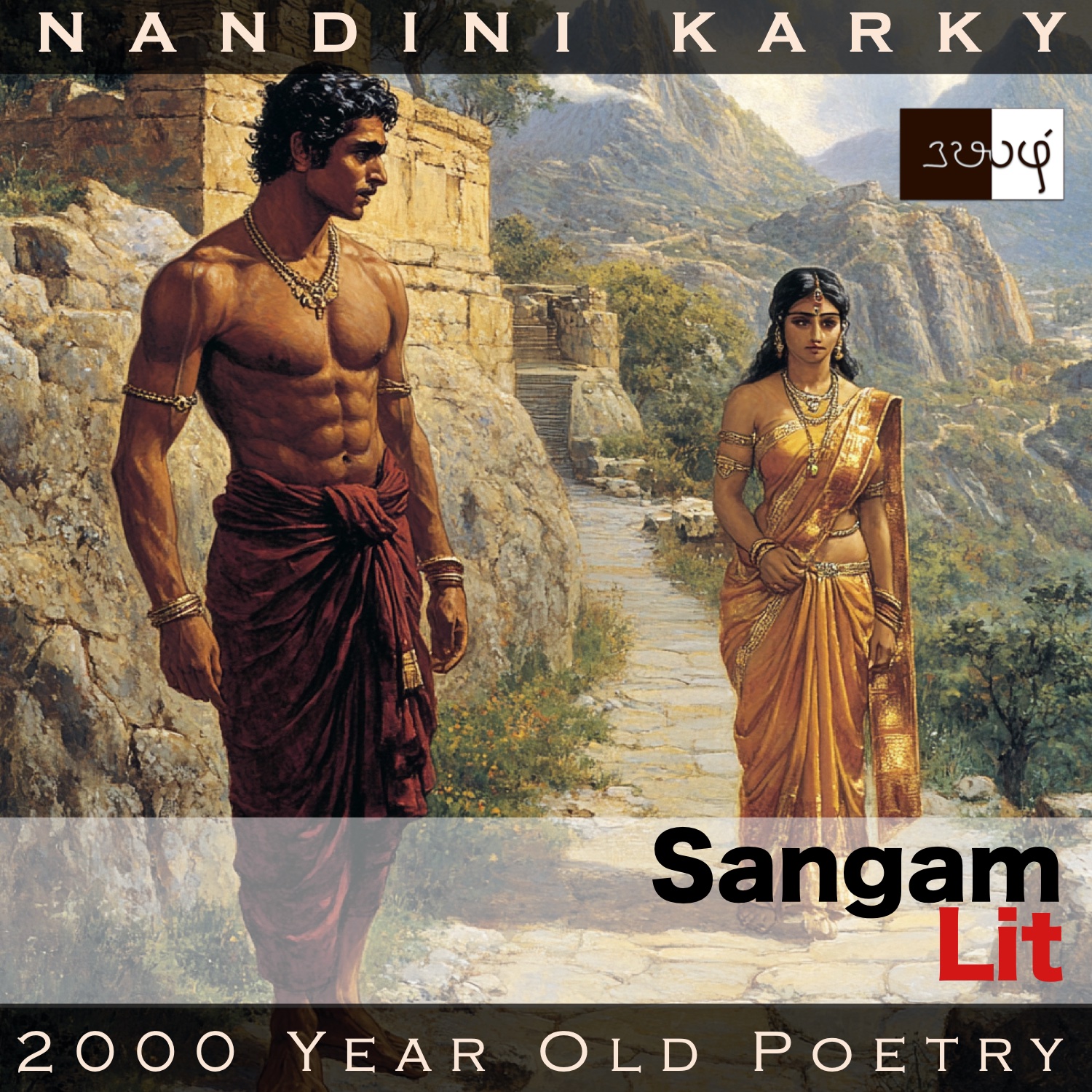Podcast: Play in new window | Download
Subscribe: Apple Podcasts | Spotify | Amazon Music | Android | iHeartRadio | TuneIn | RSS | More
In this episode, we listen to a man’s angst, as depicted in Sangam Literary work, Kalithogai 58, penned by Kabilar. The verse is situated in the ‘Kurinji’ or ‘Mountains landscape’ and depicts an ancient strategy employed to win love.

வார் உறு வணர் ஐம்பால், வணங்கு இறை நெடு மென் தோள்,
பேர் எழில் மலர் உண்கண், பிணை எழில் மான் நோக்கின்,
கார் எதிர் தளிர் மேனி, கவின் பெறு சுடர் நுதல்,
கூர் எயிற்று முகை வெண் பல், கொடி புரையும் நுசுப்பினாய்!
நேர் சிலம்பு அரி ஆர்ப்ப, நிரை தொடிக் கை வீசினை,
ஆர் உயிர் வௌவிக்கொண்டு அறிந்தீயாது இறப்பாய்! கேள்:
உளனா, என் உயிரை உண்டு, உயவு நோய் கைம்மிக,
இளமையான் உணராதாய்! நின் தவறு இல்லானும்,
களைநர் இல் நோய் செய்யும் கவின் அறிந்து, அணிந்து, தம்
வளமையான் போத்தந்த நுமர் தவறு இல் என்பாய்
நடை மெலிந்து, அயர்வு உறீஇ, நாளும் என் நலியும் நோய்
மடமையான் உணராதாய்! நின் தவறு இல்லானும்,
இடை நில்லாது எய்க்கும் நின் உரு அறிந்து, அணிந்து, தம்
உடைமையால் போத்தந்த நுமர் தவறு இல் என்பாய்
அல்லல் கூர்ந்து அழிவுற, அணங்காகி அடரும் நோய்
சொல்லினும் அறியாதாய்! நின் தவறு இல்லானும்,
ஒல்லையே உயிர் வௌவும் உரு அறிந்து, அணிந்து, தம்
செல்வத்தால் போத்தந்த நுமர் தவறு இல் என்பாய்
என ஆங்கு
ஒறுப்பின், யான் ஒறுப்பது நுமரை; யான் மற்று இந் நோய்
பொறுக்கலாம் வரைத்து அன்றிப் பெரிதாயின், பொலங்குழாய்!
மறுத்து இவ் ஊர் மன்றத்து மடல் ஏறி,
நிறுக்குவென் போல்வல் யான், நீ படு பழியே.
The man continues to be in the spotlight. The words can be translated as follows:
“With five-layered, wavy, flowing tresses, curving forearm, long and soft arms, exquisite, flower-like kohl-streaked eyes, gaze of a beautiful female deer, complexion of a new sprout in the rains, an alluring, glowing forehead, sharp bud-like white teeth, a waist akin to a vine, you are, O maiden! As those well-set anklets resound, swaying your bangle-clad arms, you seem to walk on, without realising that you are stealing away my precious life! Listen to me:
Leaving just a bit of life to say that I exist, you have devoured all the rest of it, and rendered a deep disease of affliction in me. You know not of all this, owing to your youth. Though it’s not your fault, knowing about your beauty, which would spread an affliction no one can cure, adorning you with jewels, because of their prosperity, your kin sent you out. Can you claim they are not at fault?
Making my gait lack spirit, filled with exhaustion, you have rendered this deep suffering to me. You know not of all this, owing to your naivety. Though it’s not your fault, knowing about your form, which ceaselessly torments, adorning you with jewels, because of their wealth, your kin sent you out. Can you claim they are not at fault?
Ruining me with a soaring pain, you have rendered this disease that torments like a spirit. You understand not of all this, even when it’s spoken out. Though it’s not your fault, knowing about your form, which steals a life instantly, adorning you with jewels, because of their affluence, your kin sent you out. Can you claim they are not at fault?
And so, if I have to chide someone, it’s your kin; Besides, if this affliction exceeds the limits of my ability to bear it, O maiden wearing golden earrings, I will have to climb on a ‘palmyra horse’ in this town centre and declare my suffering, and when I do, you will have to face the blame!”
Time to explore the nuances. The verse is situated in the context of a man’s love relationship with a lady, prior to marriage and speaks in the voice of the man to the lady. The man starts as usual praising the different aspects of the lady’s beauty such as her tresses, arms, eyes, complexion, forehead, teeth and waist. He talks about her resounding anklets and the way she walks swaying her hands, and tells her she does not realise that as she walks on, she’s stealing away the man’s life. Then, citing three different ways in which he is suffering, the man says that the lady is not to be blamed. The blame should fall on her kin, for sending her out, so adorned, without realising the effect she would have on him. He blames the lady’s relatives and decides when his suffering exceeds a limit, he will have no other go but to climb on a ‘palmyra horse’ and declare his love for the lady to the town entire, and when he does that, blame will fall on her, the man concludes.
A verse in which the man talks of immense suffering. The words used and the extreme anguish depicted reminds one of the same emotions expressed by the lady when the man parts away from her on a mission. Now, the gender roles are reversed and we see the man hard at work trying to win the lady’s love by expressing his state of suffering. And in the conclusion, we come across the concept of ‘Madal eruthal’ that we have seen in many other ‘Aham’ songs. When nothing else works, this was the final step taken by a man to declare his love, and was considered as not a honourable thing for the man or the lady. In most of these verses, this act is said only a threat, and perhaps, through that, the man intends to change the heart of the lady he woos. These are notions and traditions of the past, which have evolved for reasons, unfathomable to us. The only thing of relevance we can extract from this verse is the way the man shies not from talking of his suffering and pain, standing against many implicit beliefs of modern generations, as symbolised by the phrase ‘Boys don’t cry’. The echo from the pages of this ancient book reiterates the timeless truth that expression of emotions is independent of gender!




Share your thoughts...